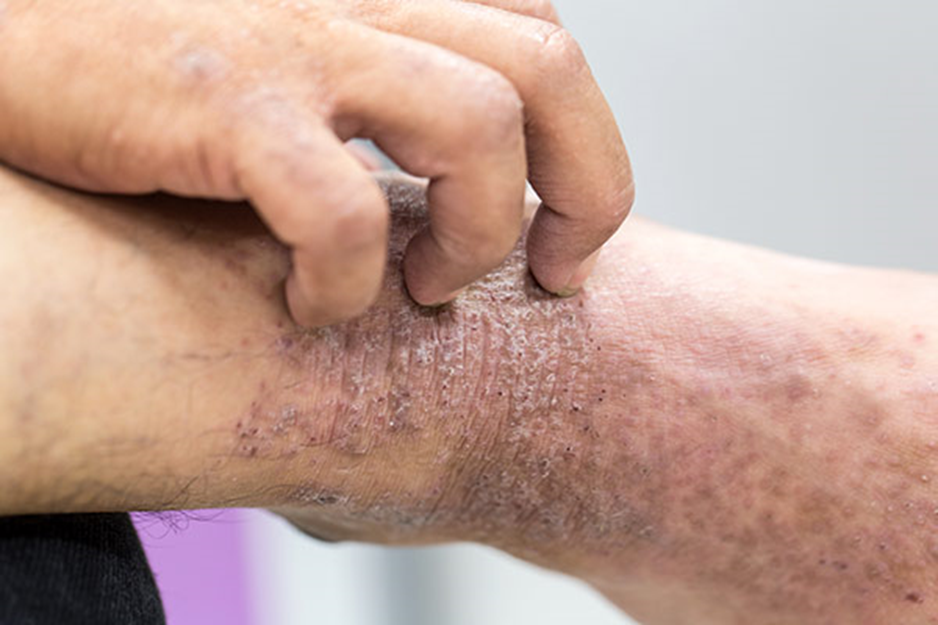A nurse is assisting with the care of a client who is receiving penicillin via intermittent IV bolus. Which of the following should the nurse recognize as a clinical manifestation of anaphylaxis?
Pallor
Peripheral edema
Hypertension
Pruritus
The Correct Answer is D
Choice A: This is incorrect because pallor is not a sign of anaphylaxis. Pallor can indicate shock, anemia, or hypoxia.
Choice B: This is incorrect because peripheral edema is not a sign of anaphylaxis. Peripheral edema can indicate heart failure, kidney disease, or venous insufficiency.
Choice C: This is incorrect because hypertension is not a sign of anaphylaxis. Hypertension can indicate stress, pain, or renal disease.
Choice D: This is correct because pruritus is a sign of anaphylaxis. Pruritus is a severe itching sensation that can accompany hives, rash, or angioedema.

Nursing Test Bank
Naxlex Comprehensive Predictor Exams
Related Questions
Correct Answer is B
Explanation
Choice A Reason:
The statement “I will wrap the suction catheters in a clean towel to be used again at a later time” is incorrect. Suction catheters should be disposed of after each use to prevent infection. Reusing catheters, even if wrapped in a clean towel, can introduce bacteria into the tracheostomy site, leading to potential infections.
Choice B Reason:
The statement “I will set the suction pressure dial between 80 and 120” is correct. The recommended suction pressure for adults is typically between 80 and 120 mmHg. This range is sufficient to effectively clear secretions without causing trauma to the tracheal mucosa. Setting the suction pressure within this range ensures safe and effective suctioning.
Choice C Reason:
The statement “I will suction for less than 15 seconds while inserting the suction catheter” is incorrect. Suctioning should be performed intermittently and for no longer than 10-15 seconds at a time. However, suctioning should not occur while inserting the catheter. Suction should be applied only while withdrawing the catheter to minimize trauma to the tracheal mucosa.
Choice D Reason:
The statement “I will suction the mouth before inserting the suction catheter into the tracheostomy” is incorrect. Suctioning the mouth before the tracheostomy can introduce oral bacteria into the tracheostomy site, increasing the risk of infection. The correct procedure is to suction the tracheostomy first and then the mouth if needed.
Correct Answer is A
Explanation
Choice A reason: Using analgesia around the clock is an appropriate action. The nurse should follow the principle of prevention rather than rescue when managing pain for a client who has terminal cancer. The nurse should administer analgesics on a regular schedule to maintain a steady level of pain relief and prevent breakthrough pain.
Choice B reason: Applying pain patches each morning and removing them at bedtime is not an appropriate action. The nurse should follow the manufacturer's instructions for applying and removing pain patches. Some patches are designed to be worn for 24 hours, while others are worn for 72 hours. Removing the patches too soon can cause inadequate pain control and withdrawal symptoms.
Choice C reason: Using intramuscular medications to control pain is not an appropriate action. The nurse should avoid using intramuscular route for administering analgesics to a client who has terminal cancer. Intramuscular injections are painful, unreliable, and increase the risk of infection and bleeding. The nurse should use oral, transdermal, or subcutaneous routes whenever possible.
Choice D reason: Decreasing a medication dose if the client develops tolerance is not an appropriate action. The nurse should understand that tolerance is a normal physiological response to long-term opioid use and does not indicate addiction or abuse. The nurse should adjust the medication dose according to the client's level of pain and response to treatment.
Whether you are a student looking to ace your exams or a practicing nurse seeking to enhance your expertise , our nursing education contents will empower you with the confidence and competence to make a difference in the lives of patients and become a respected leader in the healthcare field.
Visit Naxlex, invest in your future and unlock endless possibilities with our unparalleled nursing education contents today
Report Wrong Answer on the Current Question
Do you disagree with the answer? If yes, what is your expected answer? Explain.
Kindly be descriptive with the issue you are facing.
